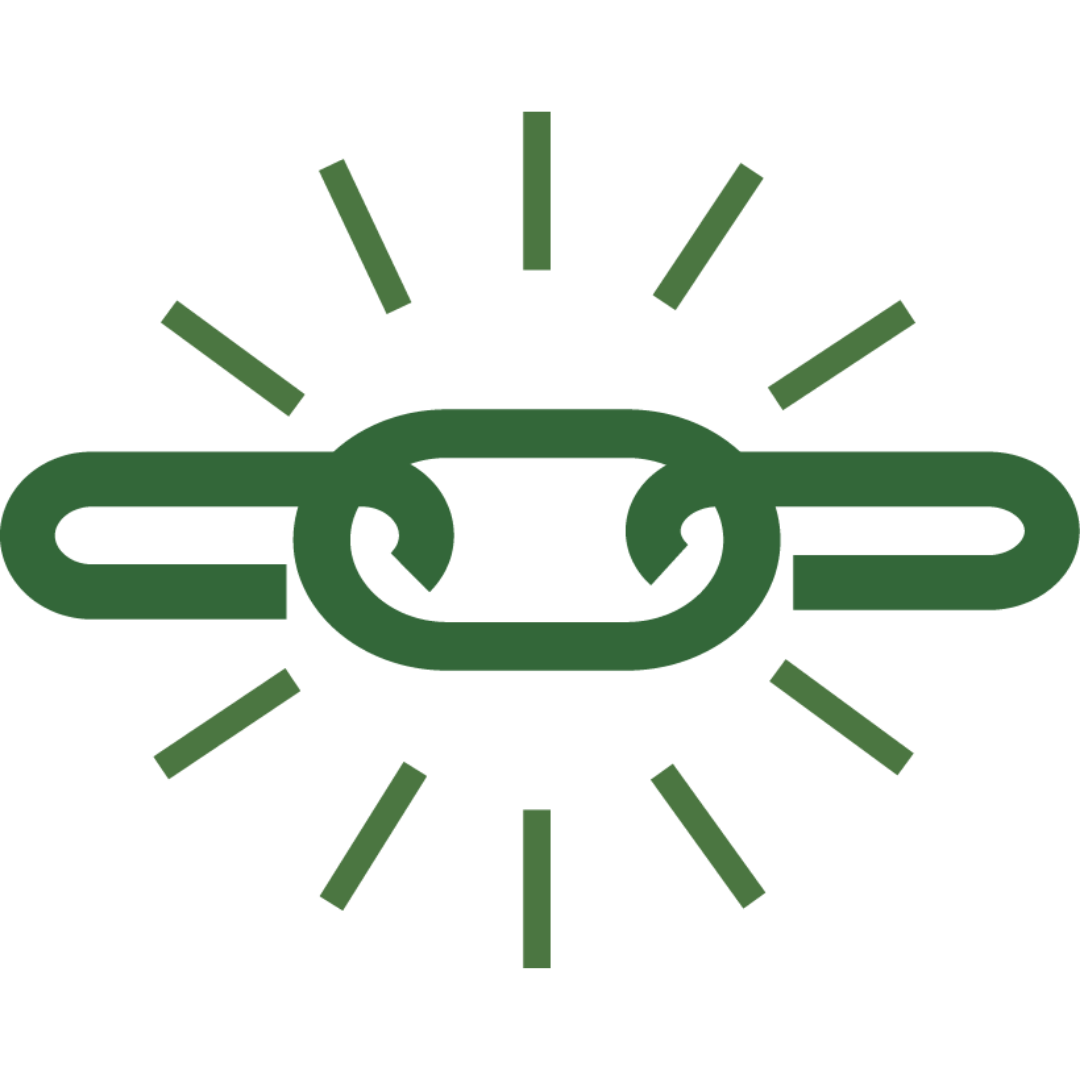Hey there, I’m Jason Ryer – you might know me as “the ice bath guy” here in Thailand.
As a certified breath coach and cold therapy guide, I’ve seen firsthand about testosterone for fatigue and how testosterone levels can make or break your energy.
Are you constantly dragging yourself through the day, feeling like a shadow of your former self?
You’re not alone.
The Testosterone for Fatigue Connection: What You Need to Know
Testosterone isn’t just about muscles and libido – it’s your secret weapon against fatigue.
Studies show that low testosterone levels are strongly linked to increased fatigue and decreased energy [1].
But here’s the kicker: testosterone levels naturally decline as we age, starting as early as our 30s [2].
That’s why so many men in their 30s and 40s find themselves struggling with unexplained tiredness.
“I used to think I was just getting old. Turns out, my testosterone was tanking, and with it, my energy.” – John, 42
My Personal Journey with Testosterone for Fatigue
I’ve been on both sides of this energy equation.
After two years of following a plant-based diet, I watched my testosterone levels plummet.
My energy?
It went right down with it.
But then I made some changes.
I fell in love (hello, natural testosterone boost!), started lifting heavy weights, and fine-tuned my lifestyle.
The result?
My testosterone levels shot through the roof – and my energy came roaring back.
Why Your Energy Levels Matter
Low energy isn’t just about feeling tired.

It affects:
- Your relationships
- Your work performance
- Your overall quality of life
You deserve to feel vibrant, alive, and full of energy.
That’s where optimizing your testosterone comes in.
Understanding Fatigue in Men
Fatigue is more than just feeling tired.
It’s a persistent lack of energy that can’t be shaken off with a good night’s sleep.
For men between 30-45, fatigue can feel like:
- Struggling to get out of bed in the morning
- Lacking the energy for hobbies or exercise
- Feeling mentally foggy and unmotivated
- Hitting a wall mid-afternoon
The prevalence?
It’s higher than you might think.
Studies suggest that up to 38% of men in this age group experience significant fatigue [3].
“Fatigue was ruining my life. I couldn’t play with my kids, my work was suffering, and my wife felt like she was living with a zombie.” – Mike, 38
The Science Behind Testosterone and Energy
So, what’s the deal with testosterone and energy?
Testosterone is like the body’s natural energy drink.
It helps:
- Boost red blood cell production, improving oxygen delivery
- Increase muscle mass, which boosts metabolism
- Enhance mood and motivation
- Improve sleep quality
When testosterone drops, all these processes take a hit.
The result?
You’re left feeling drained, unmotivated, and just… blah.
Root Causes of Low Testosterone
Low testosterone doesn’t just happen out of the blue.
Here are the main culprits:
- Age: It’s natural for testosterone to decline with age, but lifestyle factors can accelerate this.
- Poor Diet: Lack of essential nutrients can hamper testosterone production.
- Lack of Exercise: Especially strength training, which is crucial for testosterone.
- Chronic Stress: Stress hormones like cortisol can suppress testosterone production.
- Inadequate Sleep: Your body produces most of its testosterone during sleep.
- Environmental Factors: Exposure to endocrine disruptors in plastics and pollution can mess with your hormones.
- Medical Conditions: Obesity, diabetes, and thyroid disorders can all impact testosterone levels.
“In my practice, I often see men who’ve unknowingly sabotaged their testosterone levels through lifestyle choices. The good news? Many of these factors are within our control to change.” – Dr. Sarah Thompson, Endocrinologist
Symptoms of Low Testosterone: Beyond Fatigue
While fatigue is a major red flag, low testosterone can manifest in other ways too:
- Hair loss
- Decreased libido
- Decreased bone mass
- Mood changes and irritability
- Muscle loss and increased body fat
- Cognitive issues (brain fog, difficulty concentrating)
If you’re experiencing a combination of these symptoms, it might be time to get your testosterone levels checked.
Diagnosing Low Testosterone: What You Need to Know
Feeling fatigued and suspecting low testosterone?
Here’s what you need to know about diagnosing your testosterone for fatigue:

- When to test: If fatigue is persistent and accompanied by other symptoms of low testosterone.
- Types of tests: The main test is a blood test to measure free testosterone levels.
- What the results mean: Normal free testosterone levels typically range from 50 to 250 pg/mL. Below 50 ng/dL is considered low [4].
- Other tests: You might also check for other potential causes of fatigue, like thyroid issues, vitamin/mineral deficiencies, heavy metals, mold and gut issues (including parasites).
Remember, one test isn’t always definitive.
Testosterone levels can fluctuate, so you’ll want multiple tests.
Natural Ways to Boost Testosterone for Fatigue
Now for the good stuff – how to naturally boost your testosterone and reclaim your energy.
1. Exercise and Strength Training

Nothing beats lifting heavy things for boosting testosterone.
Aim for:
- Compound exercises (squats, deadlifts, bench press)
- High-intensity interval training (HIIT)
- 3-4 strength sessions per week
2. Optimize Your Diet
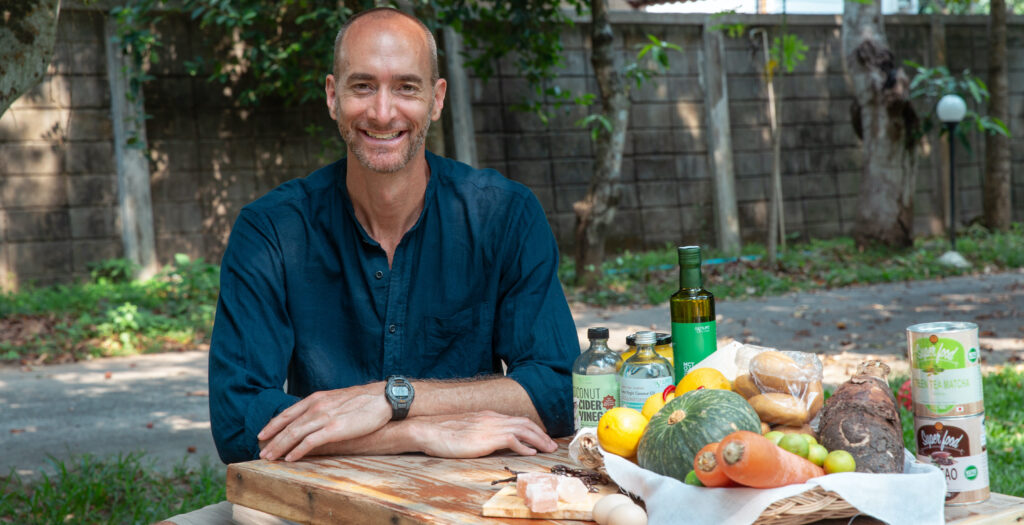
Your plate can be a powerful tool for boosting testosterone.
Focus on:
- Healthy fats (butter, beef tallow, avocados, olive oil)
- Zinc-rich foods (oysters, beef, pumpkin seeds)
- Vitamin D-rich foods (fatty fish, egg yolks)
- Clean proteins (grass-fed beef)
3. Prioritize Sleep
Most of your testosterone is produced while you sleep.
Aim for 7-9 hours of quality sleep each night.
Create a sleep routine:
- Create a dark, cool sleeping environment
- Stick to a consistent sleep schedule
- Avoid screens before bedtime
4. Manage Stress
Chronic stress is a testosterone killer.
Try these stress-busting techniques:
- Meditation
- Regular exercise
- Spending time in nature
- Coherence breathing exercises
5. Breathwork
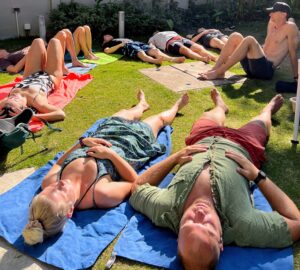
As a certified breath coach, I can’t stress enough how powerful breathwork can be for hormone balance and energy.
Try these techniques:
- Box breathing
- Resonant breathing
- My personal Zen Strength Breathwork method
6. Cold Therapy
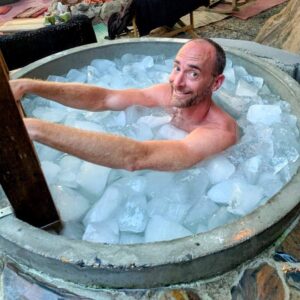
Cold exposure can give your testosterone a significant boost [5].
Start with:
- Cold showers (30 seconds to 2 minutes)
- Gradually work up to ice baths (2-5 minutes)
7. Light Therapy
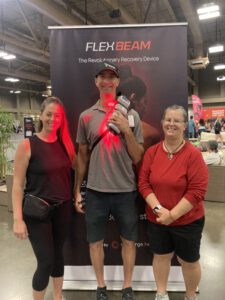
Sunlight exposure, especially in the morning, can help regulate your hormones and boost energy.
Try:
- Morning sunlight exposure for 10-15 minutes
- Red light therapy in the evening
8. Earthing/Grounding
Connecting with the earth’s natural electric charge can help reduce stress and inflammation.
Practice:
- Walking barefoot in grass or sand
- Using a grounding mat while working or sleeping
9. Boost Nitric Oxide
Nitric oxide helps improve blood flow and can indirectly support testosterone levels.
Boost it through:
- Regular exercise
- Breathing exercises
- Eating nitrate-rich foods (beetroot, leafy greens)
My Personal Energy-Boosting Protocol
Here’s what works for me:
- Morning Routine: I start each day with a nature walk, watching the sunrise over Chiang Mai, and some grounding exercises.
- Breathwork: I practice my Zen Strength Breathwork daily, combining the best elements of various techniques.
- Cold Therapy: I do ice baths 1-3 times per week, ideally in the midday sun for maximum exposure.
- Light Therapy: I use red/infrared light therapy before bed to support recovery and sleep quality.
- Diet: I focus on nutrient-dense, whole foods with a balance of healthy fats, proteins, and carbs.
- Exercise: Regular strength training and high-intensity workouts are non-negotiable for me.
Medical Treatments for Low Testosterone
Sometimes, lifestyle changes aren’t enough. That’s when medical treatments come into play.
Options include:
- Testosterone Replacement Therapy (TRT)
- Human Chorionic Gonadotropin (HCG) therapy
- Clomiphene citrate
- Anastrozole
“While TRT can be effective, it’s not a magic bullet. It’s crucial to address underlying lifestyle factors alongside any medical treatment.” – Dr. John Smith, Urologist
Always consult with a healthcare professional before starting any hormone therapy.
The Holistic Approach: Putting It All Together
Boosting testosterone and fighting fatigue isn’t about one magic solution.
It’s about a holistic approach that addresses all aspects of your lifestyle.
Remember:
- Be patient. Hormone changes take time.
- Listen to your body and adjust as needed.
- Work with healthcare professionals for personalized advice.
Conclusion: Your Journey to Boundless Energy Starts Now
Fatigue doesn’t have to be your new normal.
By understanding the testosterone-fatigue connection and taking steps to optimize your hormone levels, you can reclaim your energy and vitality.
Whether it’s through breathwork, cold therapy, lifestyle changes, or medical treatments, there’s a path forward.
Are you ready to leave fatigue behind and step into a more energized version of yourself?
Your journey to boundless energy starts now. Let’s crush fatigue together!
References:
[1] Shin, M. J., et al. (2016). “Association between testosterone and fatigue in older men.” Journal of the American Geriatrics Society.
[2] Stanworth, R. D., & Jones, T. H. (2008). “Testosterone for the aging male; current evidence and recommended practice.” Clinical Interventions in Aging.
[3] Cullen, W., Kearney, Y., & Bury, G. (2002). “Prevalence of fatigue in general practice.” Irish Journal of Medical Science.
[4] Bhasin, S., et al. (2018). “Testosterone Therapy in Men With Hypogonadism: An Endocrine Society Clinical Practice Guideline.” The Journal of Clinical Endocrinology & Metabolism.
[5] Siems, W. G., et al. (1994). “Uric acid and glutathione levels during short-term whole body cold exposure.” Free Radical Biology and Medicine.
